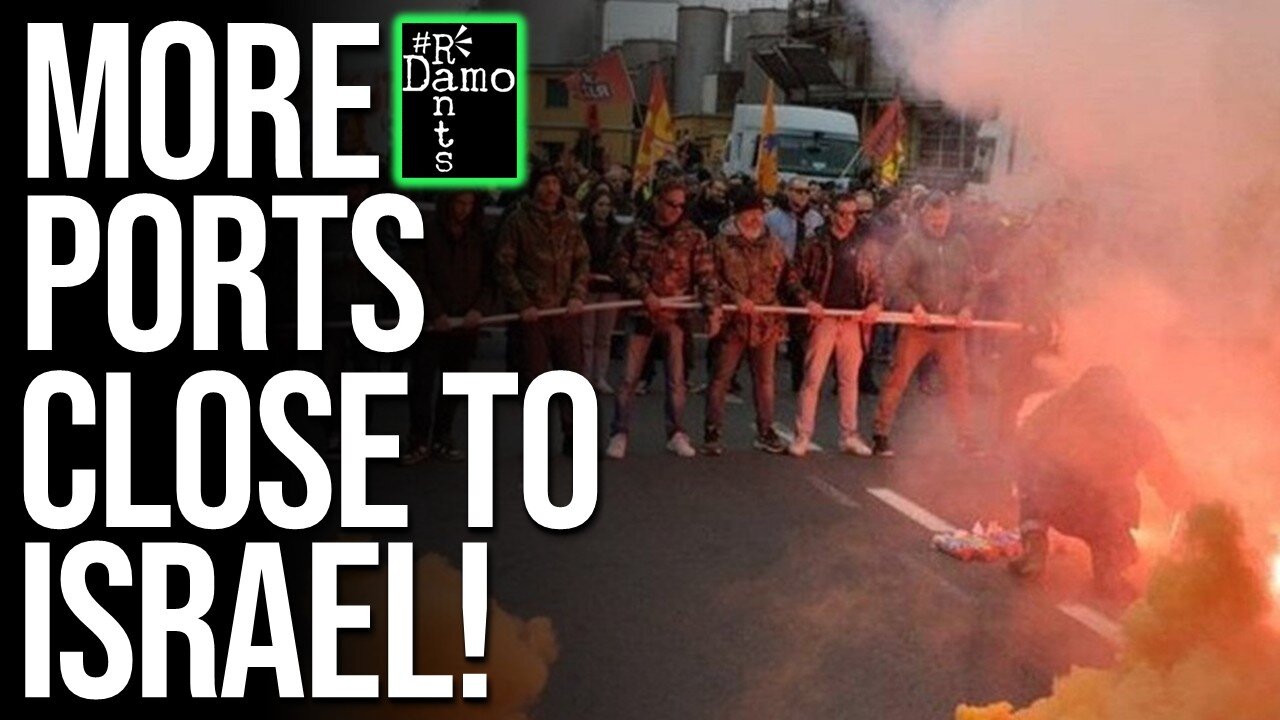Premium Only Content

Ports Lock Out Israel’s Weapons — And There's More to Come
Right, so If you want to know who’s actually trying to stop the slaughter in Gaza, don’t waste your time squinting at the photo-ops from summits or parsing the careful euphemisms of “deep concern” from Western foreign ministries. Look to the quaysides. Look to the men and women in hi-vis vests, not tailored suits, who can smell a weapons shipment before the ink is dry on the shipping manifest and who don’t need a UN resolution to tell them it’s wrong to help send it.
In Genoa this past week, they didn’t just hold placards for the cameras. They boarded a Saudi-owned ship, the Bahri Yanbu, stuffed with military cargo — some of it made right there in Italy — destined, via the usual webs of plausible deniability, to fuel Israel’s war on Gaza. They documented it, made it public, and refused to lift a finger to move it, as their fellow dockworkers in France, or Spain, or Morocco or Greece have done before them, the dissent growing around the Mediterranean against touching the tools of genocide. Meanwhile, Giorgia Meloni’s government, so fond of voicing “concerns” over civilian casualties, was busy making arms exports easier, not harder. So it fell to the dockers to enforce the very laws their leaders were gutting, to take the kind of action that can actually choke a war machine. And they did it without the theatrics of summitry or the moral cowardice of “both sides” diplomacy — just a simple, defiant, working-class “no.”
Right, so in the half-light of early morning on 7 August, the quayside at Genoa’s Ponte Etiopia looked like any other workday. Forklifts and cranes stood ready, ships lay berthed, and the usual hum of activity was beginning to stir. But that morning, the rhythms of commerce were broken by the purposeful arrival of a different kind of shift. Forty dockworkers, many wearing the red vests of Italy’s trade union federation USB and carrying the flags of the Collettivo Autonomo Lavoratori Portuali (CALP), another Italian trade union, marched towards a hulking roll-on/roll-off cargo vessel: the Bahri Yanbu. They did not come to unload its cargo though. They came to stop it.
Within minutes, several had boarded the ship, moving directly towards the decks and holds where military cargo was stowed. This was no symbolic picket or banner drop here. They had advance intelligence from their own ship-tracking networks and allied unions abroad. What they found confirmed those warnings. The holds contained armoured vehicles, tanks, crates of ammunition, and a 76mm Oto Melara naval gun — unmistakably the product of Leonardo, Italy’s largest arms manufacturer and one of the world’s most powerful defence firms. The Bahri Yanbu had arrived from Baltimore, a regular stop on Pentagon logistics routes. In Genoa, it was due to take on additional Italian-made weaponry. For the dockers, that meant direct complicity in Israel’s ongoing assault on Gaza, a campaign that as we know, plausibly amounts to genocide. They refused to touch the cargo, but they did document it.
USB’s declaration after the action was as blunt as it was uncompromising: “We don’t work for war.” The union cited Italy’s Law 185/90, which prohibits arms exports to states engaged in armed conflicts in violation of international law, and Article 11 of the Italian Constitution, which “repudiates war as an instrument of aggression against the freedom of other peoples.” Both legal instruments are more than just slogans. Law 185/90 was won after years of public campaigning to stop Italian arms flowing to repressive regimes. Article 11 is a constitutional safeguard born from Italy’s own descent into fascism and its catastrophic wartime experience. In theory, they give the Italian state both the authority and the obligation to block exactly the kind of shipment the Bahri Yanbu represented. In practice, successive governments have hollowed out their force, and Giorgia Meloni’s coalition has even moved to weaken the law by reducing parliamentary oversight and streamlining arms export approvals. As Euronews and Atlas of Wars have reported, these reforms would make it easier, not harder, for companies like Leonardo to send weapons to conflict zones. The dockworkers were not just defying their employers; they were enforcing a legal and moral duty that their own government had abdicated.
The significance of Genoa’s action becomes clearer when set against a broader regional pattern though. Across the Mediterranean in recent months, dockworkers have been at the forefront of refusing to handle arms shipments bound for Israel. In Marseille, members of the CGT union have turned away Israeli-linked cargoes, some suspected of containing military components. In Piraeus, the Greek trade union PAME has blocked ZIM line vessels linked to Israeli arms logistics and ENEDEP saw dockworkers block 5 shipments of military grade steel. In Tangier and Casablanca, Moroccan dockers have slowed or refused the processing of Israeli-related cargo despite their government’s normalisation of ties under the Abraham Accords. Spanish ports such as Valencia and Bilbao have seen the Coordinadora dockers’ union take similar steps. These actions are not emerging in isolation either. As People’s World has documented, they are coordinated through a growing network of port unions who share ship movement intelligence, alert each other to suspect cargo, and in some cases synchronise refusals so that the same vessel is denied service in multiple ports in succession.
The Bahri Yanbu is a familiar adversary in this world. Saudi-owned through Bahri, the National Shipping Company of Saudi Arabia, so this is the Saudi state complicit in this, it has been targeted by Genoa’s dockers before. In May 2019, CALP members refused to load it with arms bound for the Saudi-led war in Yemen, as covered by Daily Sabah and other outlets. In February 2020, they did so again. Amnesty International and ACAT-France have chronicled Bahri’s role in transporting military cargo for multiple conflicts, often under NATO or Pentagon charter. Its vessels frequently carry “mixed cargo,” taking on arms from different countries along their routes and delivering them through transshipment hubs, which obscures the ultimate destination. A weapon loaded in Genoa might be offloaded in Jeddah, then re-exported, or passed through US military logistics to Israel. This complexity is deliberate; it is designed to provide plausible deniability for all involved.
Saudi Arabia’s role in this supply chain underscores a deep political hypocrisy on their part of course. Publicly, Riyadh maintains that it will not normalise relations with Israel until there is progress towards a Palestinian state. In practice, as Press TV’s coverage of the Genoa action noted, Saudi shipping assets are part of a logistical network that moves Western-made arms for multiple allied militaries, Israel included. For dockworkers in Genoa, this was not an abstract diplomatic contradiction; it was a manifest reality, spelled out in the cargo manifest in their hands. By blocking the Bahri Yanbu, they were drawing a line not only against Italian and Israeli militarism, but against an Arab state enriching itself from the machinery of war being turned on another Arab people.
The Genoa blockade also demonstrated the maturation of a cross-border labour alliance. USB and CALP have cultivated ties with dockworkers’ organisations across the Mediterranean. People’s Dispatch has profiled CALP’s evolution from a local collective into a national symbol of port labour, rooted in ordinary working class rank-and-file democracy and political consciousness. Back in June, as International Socialist recounted, Genoa dockers coordinated with their counterparts in Piraeus to block an Israeli ZIM line vessel, an action echoed in Marseille and Valencia. So these cross-union alliances are not just symbolic; they are operational. Unions share real-time ship tracking data, alert each other to suspicious consignments, and sometimes plan joint actions to maximise disruption. The upcoming International Dockworkers Assembly, scheduled for next month, in light of all of this, makes for something well worth keeping an eye out on. This will bring together unions from at least eight countries — Italy, France, Greece, Spain, Morocco, South Africa, Turkey, and potentially Belgium. Its agenda includes formalising a standing “anti-war ports” network capable of mounting rolling blockades.
If such a network is established, the logistical consequences, with so many of these nations being Mediterranean, or en route to the Mediterranean, could be severe for Israel’s military supply chain. All of Israel’s imported military hardware moves through Mediterranean routes these days because the Houthis of Yemen have basically rendered the Red Sea off limits to them. If a vessel carrying arms is denied unloading in Marseille, Valencia, Genoa, and Piraeus in sequence, the delays, rerouting costs, and political embarrassment multiplies. You’re potentially looking realistically at the entire northern edge of the Mediterranean being rendered useless to Israeli logistics. Shipping companies may be forced to try and seek alternative routes, via the island states of the Mediterranean possibly, or north Africa not including Morocco, but they still have to use the Med somehow, or try and run the gauntlet through the Red Sea once more. Governments will face uncomfortable choices between cracking down on their own dockworkers — risking strikes and massive political fallout — or pressing their allies to change military policy, which Israel of course will never do, not as desperate as Netanyahu is to stay in power. Mediterranean nations who try and facilitate this will face massive questions themselves in light of this.
What happened in Genoa also speaks to a deeper question: why are dockworkers, rather than governments, enforcing the norms of humanitarian law? Italy’s government has the legal authority under Law 185/90 to halt arms shipments to Israel, given the ICJ’s finding of a plausible genocide in Gaza. It has the constitutional mandate under Article 11 to repudiate participation in aggressive war. Yet Meloni’s coalition has not exercised that authority. Instead, it has sought to loosen export controls, but then, it is a hard right administration. Therefore we shouldn’t be surprised that dockworkers have stepped forward, using their industrial power to stop what their political leaders will not. In doing so, they place themselves in a long tradition of labour internationalism, from the boycotts of South African cargo during apartheid to the refusal of Durban dockers in 2008 to unload a Chinese arms shipment bound for Zimbabwe.
The legal arguments deployed by USB and CALP are not mere rhetorical flourishes. By framing their refusal as compliance with Italian law and the constitution, they shield themselves against employer retaliation and potential criminal charges. International labour law, including conventions of the International Labour Organisation, recognises the right of workers to refuse dangerous or unethical work. Handling weapons bound for a warzone where civilians are being killed in large numbers, the dockers argue, meets that threshold. This legalistic approach also increases political pressure on the government: prosecuting the dockers would require publicly arguing that aiding Israel’s military campaign in Gaza is lawful and compatible with Italy’s constitutional values. Good luck selling that bottle of snake oil.
The symbolism of the Bahri Yanbu action has resonated because it was visible, direct, and collective. The image of workers standing on the deck of a foreign-flagged ship, refusing to be the final link in a chain of complicity, cuts through the abstractions of policy debate. It also punctures the elaborate deniability built into the arms trade. The Cradle’s reporting emphasised how multi-leg, multi-client shipping allows states and companies to obscure the true destination of weapons. By boarding the vessel and documenting its contents, the Genoa dockers made that destination — and Italy’s role in arming it — impossible to ignore.
The road ahead for the “people’s blockade” will not be without challenges. Sustaining rolling refusals across multiple ports requires resources, coordination, and mutual support. Governments may test the resolve of unions with legal threats, police intervention, or efforts to divide workers as bad as the optics of that will be. In Morocco, dockers have reportedly faced quiet pressure from authorities to downplay their actions. In Greece, PAME’s actions has attracted police surveillance. In Italy, CALP and USB have faced legal harassment in the past for anti-war protests. The September Assembly will need to address these realities, perhaps by creating a rapid-response solidarity mechanism so that an attack on one union triggers supportive actions in others.
Yet the potential is clear. What is taking shape in the Mediterranean is not simply a series of protests but the beginnings of an independent enforcement mechanism for humanitarian norms — one rooted in the organised power of labour by ordinary working class people. If governments will not impose an arms embargo on Israel in the face of overwhelming evidence of war crimes, workers can, and in some ports, already are. This inversion of political agency — from state to shop floor — is what makes the movement so politically potent. It suggests that, even in a globalised economy where capital flows freely and supply chains are tightly controlled, there are chokepoints where human beings can still say no.
The Bahri Yanbu blockade in Genoa may be remembered as the moment Italy’s dockworkers decisively joined that effort. It was an action born of local organisation, shaped by international solidarity, and carried out in defiance of both the Italian government’s complicity and the Saudi state’s hypocrisy. It drew on a history of resistance in the same port, where the same ship has been turned away before, and on a growing network of trade unions determined to make “We don’t work for war” more than a slogan. In the months ahead, as the International Dockworkers Assembly convenes and the possibility of a formal Mediterranean arms blockade comes into focus, the example set in Genoa will be both a rallying point and a test. It will measure whether a movement powered by ordinary working people can impose a moral red line where governments have failed — and in doing so, change the course of a war.
Away from the Mediterranean, similar blockades are going on, but this time of a more political sort as the Netherlands and Sweden have joined forces to try and sort out the impotence of the EU by seeking the suspension of the EU-Israel Association Agreement which would put more than just arms at risk for Israel, but literally everything else too coming from their biggest trade partner, but can they pull this off? Check out this video recommendation here as your suggested next watch to get the details of that.
Please do also hit like, share and subscribe if you haven’t done so already so as to ensure you don’t miss out on all new daily content as well as spreading the word and helping to support the channel at the same time which is very much appreciated, holding power to account for ordinary working class people and I will hopefully catch you on the next vid. Cheers folks.
-
 40:58
40:58
Clownfish TV
5 hours agoHollywood is BROKE and JOBLESS?! Animation Most Affected! | Clownfish TV
8.84K4 -
 LIVE
LIVE
Benny Johnson
1 hour agoTrump Deploys National Guard to Chicago as Democrat Leader Caught CALLING For Murder of Republicans
5,952 watching -
 LIVE
LIVE
Caleb Hammer
12 hours ago$300,000 Of Debt To "Flee Trump’s America" | Financial Audit
128 watching -
 12:37
12:37
The Big Mig™
2 hours agoNow We Know Why They Raided Mar A Lago!
4.85K8 -
 LIVE
LIVE
Badlands Media
5 hours agoBadlands Daily: October 6, 2025
4,104 watching -
 1:43:31
1:43:31
Dear America
3 hours agoDems Are The Party Of MURDER?! + TPUSA Debunks Claim By Candace Owens!
83.6K43 -
 30:00
30:00
BEK TV
5 days agoGUT HEALTH AND THE POWER OF KIMCHI WITH KIM BRIGHT ON TRENT ON THE LOOS
102K9 -
 LIVE
LIVE
Total Horse Channel
14 hours agoLow Roller Reining Classic | Main Arena | October 6th, 2025
15 watching -
 DVR
DVR
Matt Kohrs
12 hours agoStock Market Open: MONSTER GAINS || Live Trading Futures & Options
23.5K -
 LIVE
LIVE
Wendy Bell Radio
6 hours agoDemocrats Need To Look In The Mirror
7,178 watching
